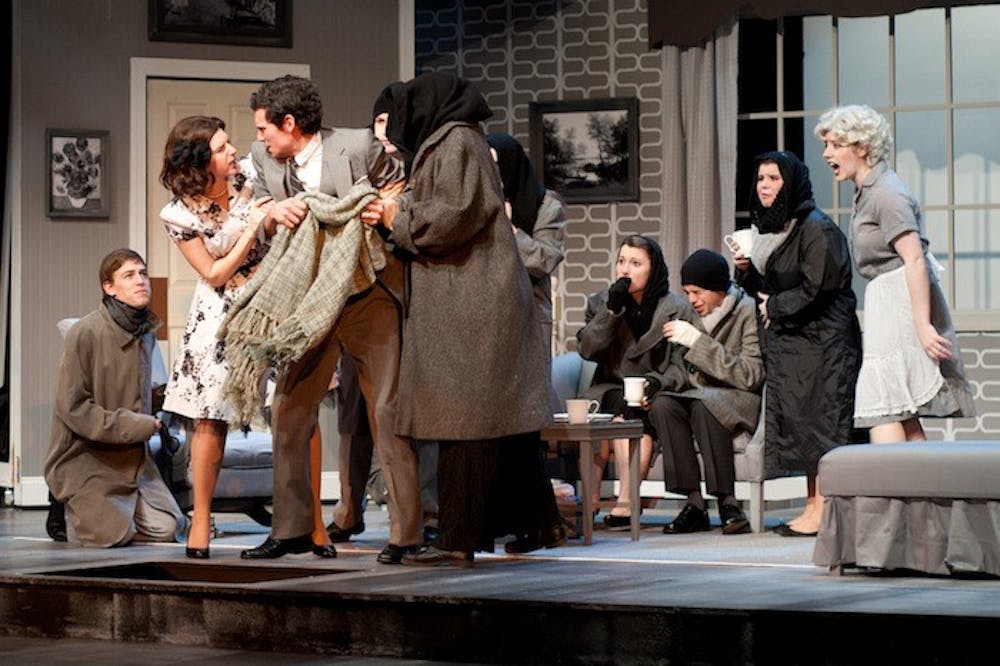With an epic narrative that encapsulates the Ice Age, an apocalyptic rainstorm and a devastating war, the Department of Performing Arts’ production of Thornton Wilder’s “The Skin of Our Teeth” is not a casual trifle.
This ostensible comedy is an artistically ambitious undertaking, especially since it is in conjunction with the group of AU students performing the one-act play “The Long Christmas Dinner” at Ford’s Theatre’s 75th-anniversary celebration of Wilder’s “Our Town” on Feb. 11.
Director Carl Menninger, a theater professor at AU, has helmed “The Skin of Our Teeth” once before, but he said this new production is “much darker.”
During the development process, Menninger noticed that several events in the play were “eerily similar to recent world events” including global warming, the 9/11 attacks and even Hurricane Sandy. Although the play was written in the 1940s, he said that the themes are frighteningly more relevant to audiences today.
The epoch-spanning narrative follows an outwardly ordinary nuclear family as they navigate some of the world’s most imposing disasters. Each act adopts a different aesthetic style that reflects pertinent themes.
The first act, which depicts a suburban version of the Ice Age, looks and feels like a ‘50s sitcom, complete with black-and-white lighting, old-fashioned cameras and a laugh track.
By the second act, though the apocalypse has arrived in the guise of an ‘80s sitcom, the brightly colored Las Vegas casinos hide the underlying turmoil.
The show’s final act, which depicts a desolate postwar landscape, deviates from the TV show format entirely, stripping away the pop culture artifice to reveal the family underneath.
“Families can survive anything,” Menninger said, qualifying Wilder’s assertion that his play is about the ability of humankind to survive.
Naturally, such extravagant settings presented numerous challenges. Rather than close the curtain between acts, the actors and crew members conduct the set changes in full view of the audience. Menninger explained that this decision strengthens the metaphor implied by the TV show aesthetic because “it has the feel of a soundstage.”
In addition to the three different settings, characters like housemaid Sabina (College of Arts and Sciences senior Amy Wilson) frequently interrupt the flow of the dialogue to address the audience directly, ridiculing and punctuating Wilder’s potentially ponderous symbolism.
“They have to live in a bunch of different worlds at once,” said assistant director Megan Westman, a senior in the College of Arts and Sciences.
Stage manager Dorothy Trigg, a junior in the School of Communication and CAS, cherished the opportunity to watch the progression in real time.
“It was great to see the actors grow in their roles,” Trigg said.
Because of the complexities of lighting to evoke different eras, Menninger decided to break the mold in choosing a lighting designer. As a result, Xena Petkanas, a senior in CAS who previously served as Menninger’s lighting designer in a Katzen Arts Center production of “Bare,” became the first AU student to serve as lighting designer for a show in the Greenberg Theatre.
Petkanas said even a concept as seemingly simple as a black-and-white glow proved difficult to attain. With the help of her “really talented design team” and Menninger’s confidence in her abilities, Petkanas said her first experience as a lighting designer in this venue was a success.
“I feel really lucky,” Petkanas said.
Menninger said the student actors and crew members allowed him to assume the role of “collaborator” rather than “dictator.” The most rewarding aspect of the production was the opportunity to watch these actors complement his vision with their own, he said.
“I am so grateful for their artistry and intelligence,” Menninger said.
mlieberman@theeagleonline.com





